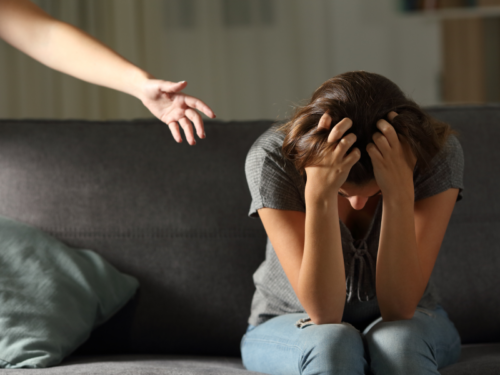
Table of Contents
Your Guide to Dating Someone With OCD, According to Experts

Written By: Ashley Laderer

Clinically Reviewed By: Erin Husting
December 20, 2024
8 min.
Are you dating someone with OCD and wondering how to be a better partner? Read on for tips from the experts.
Learn more about our Clinical Review Process
Table of Contents
Romantic relationships are hard for anyone –– but if you’re dating someone with a mental health condition like obsessive-compulsive disorder (OCD), you may face some additional obstacles that require patience, empathy, and understanding. While there may be some myths or misconceptions from people who think that individuals with OCD can’t have a successful relationship, this is not true, says Alysson Thewes, MSW, LCSW, a Charlie Health Primary Therapist. People with OCD can absolutely have healthy and happy relationships –– especially if they’re putting in the work to receive treatment and practice open communication.
Whether you’ve just started dating someone with OCD or you’re already in a long-term relationship, you can always learn more about the condition and what it means for your partnership. Here’s what you need to know about the challenges OCD can present in relationships, as well as tips for dating someone with OCD.

Support for you or your loved one
Virtual therapy for dealing with mental health concerns.
Understanding the challenges of OCD and relationships
If your partner has OCD, it’s important to understand the challenges that come from both sides. Understanding your partner’s challenges can help you be more empathetic and get a peek inside their heads.
Challenges someone with OCD might face in a relationship
Dealing with OCD is incredibly difficult and exhausting, impacting many aspects of life. Here are a few examples of how having OCD affects relationships and dating.
Relationship OCD thoughts
There’s a specific OCD theme/subtype called relationship OCD (ROCD). People who struggle with relationship OCD face relationship-specific obsessions and compulsions. “Someone with ROCD might obsess or have consistent intrusive thoughts about their relationship or partner,” says Jonathan Kohlmeier, M.A., Senior Manager of Clinical Innovation at Charlie Health. “Oftentimes these intrusive thoughts might center around doubt that lead to constant reassurance seeking or over-analyzing every interaction.”
Some examples of ROCD obsessions include:
- Doubting whether their partner is right for them
- Wondering if their partner is “the one”
- Questioning whether their partner truly loves them (and vice versa)
- Questioning their attraction to their partner (and vice versa)
Ultimately, there will be many cognitive distortions, or maladaptive ways of thinking, surrounding the relationship, says Thewes. “The person with OCD may not trust themselves and think of a worst-case scenario,” she says. “They may think, ‘Maybe I don’t actually love this person. Am I wasting my time? Do they actually love me? No, they probably don’t love me.”
An obsession will lead to a compulsion such as ruminating, avoiding certain scenarios that might bring up more doubt, seeking reassurance, and consistently checking in on their own feelings.
Shame and fear of opening up
Many people with OCD feel shame, guilt, or embarrassment surrounding their obsessions and compulsions. Many people’s OCD obsessions and intrusive thoughts center around inappropriate or taboo topics, such as violence or sex, leading to shame. Someone with OCD may be afraid to disclose the nature of their intrusive thoughts to their partner for fear of being judged or misunderstood. They may fear that they’ll be unlovable if they’re 100% themselves, OCD at all.
Struggles with sexual intimacy
It’s common for people with OCD to experience some type of sexual dysfunction, whether that’s trouble getting aroused, having a low libido, or having trouble reaching orgasm –– all of which can take a toll on an intimate relationship. This could be due to various reasons, including fears or obsessions surrounding sex. For example, Kohlmeier says someone with contamination-focused OCD may struggle with physical intimacy. Their obsessions and fear of getting sick can mess with their sex drive. Or, if someone experiences distressing, intrusive thoughts during sex, this can cause arousal to plummet –– and even lead to future avoidance of sexual intimacy.

Challenges the partner of someone with OCD might face in a relationship
The challenges someone faces will vary from relationship to relationship. It also depends on how severe someone’s OCD is. If you’re in a relationship with someone who has severe OCD, you may be more likely to face some of these challenges. Here are a few examples of challenges you might face:
1. Confusion and trouble understanding OCD
OCD is typically not viewed as “rational” by those without OCD. If you’ve never experienced OCD yourself, you might have a very hard time understanding why your partner acts the way they do, related to their OCD symptoms.
“Many of the behaviors that someone with OCD may exhibit may also seem entirely irrational and counterproductive to an outsider, like excessive hand washing, avoiding certain places, or constant reassurance seeking,” says Kohlmeier. “For example, someone with OCD might avoid holding hands due to contamination fears, which can be misinterpreted as a lack of affection or interest. Without clear communication, these behaviors can lead to a lot of confusion.”
2. Navigating the need for reassurance
It’s common for people with OCD to engage in reassurance-seeking behaviors, which may frustrate you. “Navigating that need for reassurance can feel exhausting at times,” says Kohlmeier. “For example, a partner might be asked repeatedly if the relationship is okay or if the person with OCD is safe.”
Or, your partner might ask you for reassurance as a part of other compulsions, such as asking you if they definitely turned off the stove, locked the door, and so on. It can be difficult to navigate this reassurance-seeking behavior and know when you should or shouldn’t engage.
3. Emotional strain
Dating someone with OCD can be emotionally challenging at times. It can be hard to watch someone you love and care about suffer from so much distress and anxiety. You might feel mixed emotions, and this is normal. Or, you may feel like most of the emotional labor in the relationship is going towards your partner with OCD, and the relationship is unbalanced.
4. Frustration surrounding a lack of treatment
If your romantic partner has OCD but refuses to seek treatment or stick with treatment, this can certainly lead to frustration. It’s hard when you want your partner to get better, but they are not willing to accept help or put in the work to heal. “Over time, that’s going to erode the relationship, whether the relationship ends up being very unhealthy or ends altogether,” Thewes says.
7 tips for dating someone with OCD
As Thewes mentioned, it’s certainly possible to have a healthy relationship with someone who has OCD. Here are seven practical tips for dating someone with OCD.
1. Educate yourself
“The first priority should be to educate yourself and understand as much about the disorder as you can, including how intrusive thoughts and compulsions may impact individuals with OCD,” says Kohlmeier. “Better understanding can help turn that frustration and confusion into empathy and compassion.”
Reading articles like this is a good place to start. You can learn more on the Charlie Health blog here or other reputable sources like the International OCD Foundation or the National Institute of Mental Health.
2. Keep the line of communication open
Communication is key in any relationship, but it’s extra crucial when one partner is struggling with their mental health.
“It’s important to have continuous open dialogue between both partners about what symptoms they are experiencing and how different actions are impacting it,” Kohlmeier says.
Let your partner know that you are here to listen and that you truly want to understand. Make sure they know that this is a safe space for them to talk without judgment.
3. Encourage treatment
“Nobody wants to live with OCD and have it consume their life, but it can be very hard to seek treatment or ask for help,” Kohlmeier explains. “It’s important for those around the individual to gently but consistently encourage the individual to seek treatment. Evidence-based treatments like ERP for OCD can be life-changing and loosen the grip that OCD has on someone’s life.”
You can even research treatment options, such as exposure and response prevention (ERP) therapy and cognitive behavioral therapy (CBT), and share your findings with your partner.
It’s also important to find balance here because you don’t want to be too pushy and force treatment on them. Ultimately, you can’t help someone who doesn’t want the help.
4. Remember, recovery isn’t linear
Whether or not your loved one is in treatment, remember that recovery isn’t linear. People recover at different paces, and there will always be ups and downs. As the partner of someone with OCD, you should anticipate that there will be good days and bad days. Be patient and know that OCD recovery isn’t quick –– it takes time and hard work.
5. Know what *not* to say
Sometimes, knowing what not to say is just as important as knowing what you should say. The main goal is that you want to make sure they don’t feel judged, belittled, or invalidated.
Here are a few examples of what you should not say to a partner (or anyone else) with OCD:
- “Relax”
- “Stop worrying so much.”
- “I’m a little OCD too,” or “Everyone’s a little OCD.”
- “You don’t look like/seem like you have OCD.”
- “Why can’t you just stop?
6. Set boundaries
It’s crucial to set boundaries with someone who has OCD because you don’t want to become a part of their OCD cycle. Feeding into their need for reassurance or participating in any of their rituals or repetitive behavior can enable them –– and unintentionally reinforce their OCD.
“It’s natural and healthy to want to accommodate your partner’s OCD to reduce their distress in the moment, such as helping them avoid certain places,” says Kohlmeier. “However, over time, these acts just strengthen the behavior and the urge. It’s important to strike a balance between fully accommodating and supporting the individual.”
Don’t be afraid to stand your ground and let your boundaries be known –– letting them know you’re ultimately doing this for their sake.
7. Don’t forget to take care of yourself
When caring for someone else, you can get so swept up in it that you forget to take care of yourself. However, you can only care for others after caring for yourself. It’s normal and healthy to take some time to be independent without your partner and recharge.
Here are some self-care tips for improving your mental health:
- Practicing mindfulness
- Trying guided meditations
- Getting enough high-quality sleep every night
- Exercising
- Talking to a friend or family member
- Journaling
- Making art or music

How Charlie Health can help
If you or a loved one has obsessive-compulsive disorder (OCD), Charlie Health is here to help. Charlie Health’s virtual Intensive Outpatient Program (IOP) provides more than once-weekly mental health treatment for individuals and families dealing with serious mental health conditions, such as OCD. Our expert clinicians incorporate evidence-based therapies into individual counseling, family therapy, and group sessions. We also offer medication management as needed for OCD treatment. With professional help, a personalized treatment plan, and the right support team, managing OCD is possible. Fill out the form below or give us a call to start healing today.




